Welcome New Tenure-Track Faculty 2025-26
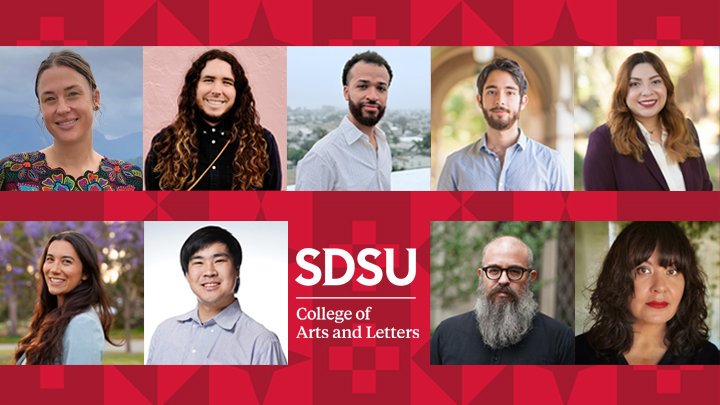
The College of Arts and Letters is pleased to welcome nine new faculty in fall 2025, where departments across the college are expanding research in the social sciences and humanities. These new scholars are leaders in their fields of Black Atlantic issues, Jotería studies, Latina/o sociology, Mexican and Central American politics, Chicanx borderlands and feminism, economics of crime, and more.
Meet Our New Faculty
Haley Ciborowski, Geography
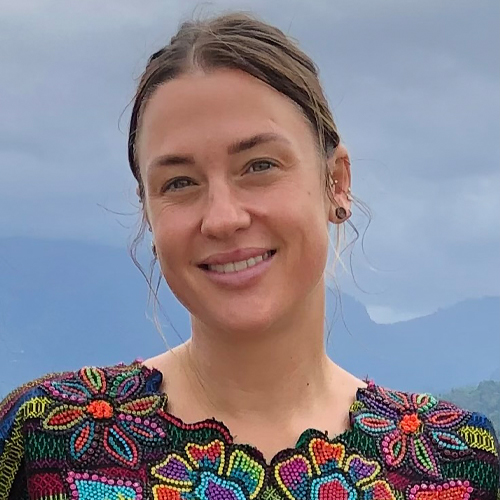 Haley Ciborowski is an assistant professor in the Department of Geography with affiliation with the Center for Latin American Studies. Ciborowski is a global health scientist and practitioner whose work explores the complex intersections of health, mobility, and borders. Specializing in the lived experiences of Indigenous and migrant communities in Latin America and the U.S.-Mexico borderlands, she examines how physical and political borders shape access to care, exposure to environmental risks, and structural health inequities. Her interdisciplinary research combines public health, environmental science, and social processes and is grounded in deep, sustained partnerships, co-producing knowledge to understand and respond to transnational challenges. As founding director of the Global Healthcare Project, she leads collaborative initiatives that transcend borders to build health and socioeconomic equity and climate resilience for mobile populations.
Haley Ciborowski is an assistant professor in the Department of Geography with affiliation with the Center for Latin American Studies. Ciborowski is a global health scientist and practitioner whose work explores the complex intersections of health, mobility, and borders. Specializing in the lived experiences of Indigenous and migrant communities in Latin America and the U.S.-Mexico borderlands, she examines how physical and political borders shape access to care, exposure to environmental risks, and structural health inequities. Her interdisciplinary research combines public health, environmental science, and social processes and is grounded in deep, sustained partnerships, co-producing knowledge to understand and respond to transnational challenges. As founding director of the Global Healthcare Project, she leads collaborative initiatives that transcend borders to build health and socioeconomic equity and climate resilience for mobile populations.
Matthew Fowler, American Indian Studies

Matthew Fowler is originally from the High Desert region of Southern California, and spent a portion of his life in Baltimore, Maryland before relocating to San Diego. He is of Indigenous P’urhépecha and Otomí descent through his paternal line. His work centers ethnopoetics, visual sovereignty, Indigeneity and relationality, land and migration, survivance, reclamation and preservation, border studies, sociopolitical criticism, decolonization, and social milieus and movements.
Fowler holds an associate degree from Harford Community College, a bachelor of arts in literature and writing studies from California State University San Marcos, and a master of fine arts in creative writing from San Diego State University. Fowler is a Sarah B. Marsh-Rebelo Award recipient, and his work can be found in online and print publications, including, PRISM International, Quarterly West, Sycamore Review, The Los Angeles Review, and elsewhere.
Fowler’s current research and book manuscript, titled “Everything Like Yellow Turmeric,” invokes ancestral memory and community obligation to situate storytelling as an epistemological foundation. This hybrid narrative explores the relationship between trade flows, migration, adoption, and environmental catastrophe. “Everything Like Yellow Turmeric” positions language preservation and spiritual healing as retaliatory methodologies against settler colonialism and an affirmation of sovereignty that maps geographies, drives the process of reterritorialization, and perpetuates cultural inheritance for future generations.
Tyler Grand-Pre, English and Comparative Literature
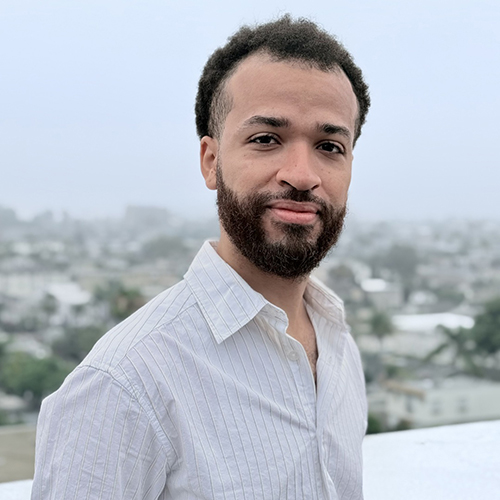
Tyler Grand-Pre earned a Ph.D in English and comparative literature at Columbia University and a B.A. at the University of Illinois at Chicago where he double-majored in English as well as French and Francophone literatures. His research ranges across African diaspora studies, translation studies, ecocriticism, and architecture and urban planning. His current project engages the infrastructure of housing as an expressive medium through which writers, artists, and architects have spoken to socio-economic imbalance, structural racism, and neo-colonialism in the U.S. and Caribbean. Given his interest in translation, Grand-Pre has translated between French and English for Routledge as well as the NGO Women’s Global Education Project, and he is currently working on a translation of the book-length and bilingual (French and Creole) poem “Nostrom” (1982) by the Martinican poet Monchoachi. He has also published articles in Comparative Literature, New Labor Forum, as well as Small Axe Blog.
Gustavo Guajardo, Political Science
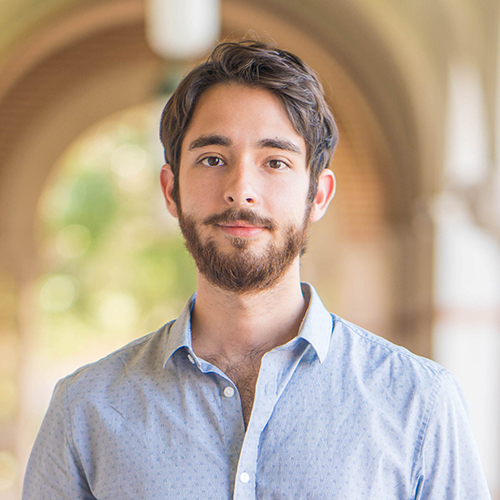
Gustavo Guajardo received his M.A. and Ph.D. in political science from Rice University and his B.A. from Instituto Tecnológico Autónomo de México (ITAM). His research agenda explores how corruption and accountability intersect with electoral institutions, legislative behavior, and representation, with a regional focus in Latin America. Guajardo’s dissertation examines the conditions under which politicians advance anticorruption reform, and his work often employs large-n observational data analysis, causal inference, natural experiments, and elite interviews from fieldwork experiences. Guajardo’s articles have been published in the American Political Science Review, Comparative Political Studies, and Legislative Studies Quarterly.
Brenda Lara, Chicana and Chicano Studies and English and Comparative Literature
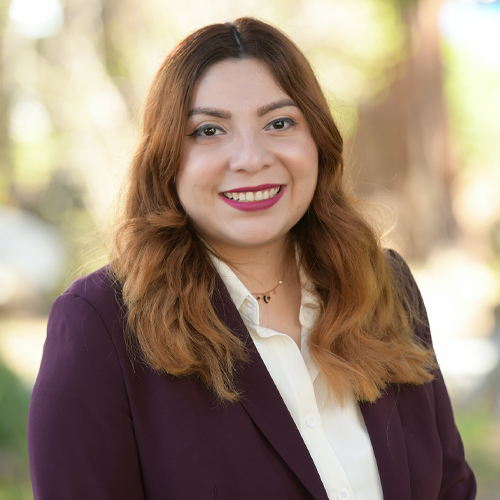
Brenda Lara (she/they) earned her Ph.D. from UCLA’s Department of Chicana/o and Central American Studies with an emphasis in gender studies and experimental critical theory. Before arriving at SDSU, she was a University of California president’s postdoctoral fellow at UC Santa Cruz’s literature department. As a first-generation student, born and raised in Southeast Los Angeles, her upbringing influences her research on LGBTQ+ archives, Latinx folklore and horror, and feminist literature and theory. Lara’s interdisciplinary work intersects Chicana feminism and hauntology — a framework that analyzes repressed histories through the supernatural — to research LGBTQ+ Latinx narratives. Her first book project, “Latinx Hauntings,” deconstructs the cycle of queer Latinx scholars’ untimely deaths and legacies in academia. She currently serves as a board member for the Center for Black, Brown, and Queer Studies and is the recipient of the Inter-University Program for Latino Research Mellon Fellowship. Lara has published articles in Genre: Forms of Discourse and Culture, Camino Real: Estudios de las Hispanidades Norteamericanas, and the award-winning collection “Monsters & Saints” (2024).
Caroline Martínez, Sociology

Caroline Martínez is a sociologist of race, indigeneity, and migration. She received her Ph.D. in sociology from the University of California, Irvine and her M.A. from the Facultad Latinoamericana de Ciencias Sociales-Ecuador. As someone who grew up in Ecuador and the United States, Martínez seeks to create greater understandings between distinct racial ideologies that emerged in South, Central, and North America and that inform how we think about racial categories and boundaries, and, thus, determine the allocation of resources and rights. Martínez’s research agenda is driven by her commitment to making visible the racial inequality between groups that are often overlooked, such as Indigenous Latinxs. In her research, she focuses on how Indigenous peoples identify and how they are racialized by others, as well as the consequences of this racialization in Latin America and the United States. Martínez’s research has been featured in the American Journal of Sociology and Sociology of Race and Ethnicity and has received awards from the Sociology of Indigenous Peoples and Native Nations Section of the American Sociological Association and UC Irvine’s School of Social Sciences.
Kyutaro (Kyu) Matsuzawa, Economics

Kyutaro (Kyu) Matsuzawa is returning home to San Diego State University, but this time as an assistant professor of economics. He recently received his Ph.D. from the University of Oregon, and prior to his doctorate studies, he spent seven years at SDSU as an undergraduate, master's, and pre-doctoral student and fellow. Matsuzawa’s research interests include the economics of crime and health and labor economics where he combines economic theory, several datasets, and cutting-edge econometric techniques to explore the intersection of public policy and individual behavior. His work has been published in several top field economics journals, including, but not limited to, the Journal of Human Resources, the Journal of Applied Econometrics, and the Journal of Law and Economics. He is also affiliated with the Center for Health Economics & Policy Studies as the chief of staff and the constable of the center’s new Economics of Crime Research Division.
Ishai Mishory, Study of Religion
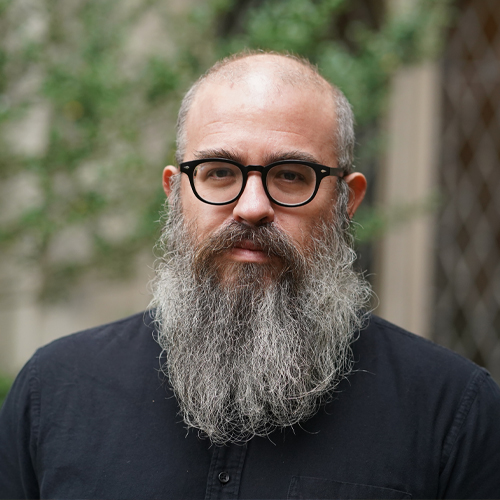
Ishai Mishory received his M.A. (2019), M.Phil. (2020), and Ph.D. (2024) in religious studies from Columbia University, and was a postdoctoral lecturer of the Core in Literature Humanities (2024–2025) there. His research focuses on printing by Jews and non-Jews in the early modern period as a site of negotiation regarding “what a book is.” Marrying the material and intellectual facets of book history, Mishory’s work in Jewish history questions narratives of religious history, alterity, ‘worldliness,’ community and communication.
Combining archival, bibliographical and historical work with a theoretical intervention on religion and secularism, Ishai’s current book project explores the printing work of a 16th-century Jewish printer across Italy and the Ottoman Empire in Hebrew, Latin and Italian. The book asks: what is, or could be, a “Jewish secularity” beyond a Christian definition? Does the adamancy of (certain) early modern Jews to ‘be in the world’ in any way change the received story of a so-called “process of Jewish secularization”? The interdisciplinary research for the book has included archival work in Italy as part of a Fulbright Fellowship, and a fellowship at the Center for Jewish History (New York City). Mishory is the translator of several academic and fictional texts, and has illustrated several children’s books.
Gretel H. Vera-Rosas, Chicana and Chicano Studies
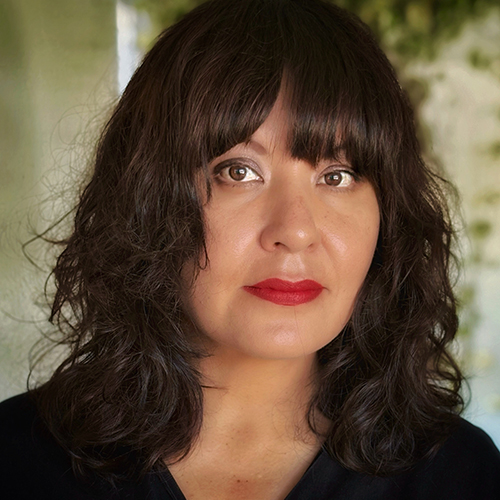
Associate Professor Gretel H. Vera-Rosas is a poet and an interdisciplinary scholar whose work analyzes gendered power, migration, and expressive culture to trace the social worlds of those who exist outside the boundaries of legality and at the margins of global capitalism.
She studied photography and creative writing at El Camino Community College and has a B.A. in literature with a focus on modern literary studies from the University of California, Santa Cruz. She earned her M.A. and Ph.D. in American studies and ethnicity from the University of Southern California.
Vera-Rosas is currently working on a book manuscript that explores the limits and opportunities offered by visual cultural production to think critically about the social worlds destroyed and produced by the drug wars and security and immigration policies in the hemisphere. This book project centers film, silk-screening, performance, and photography to analyze the visual economies of deportation, migration, and the war on drugs in Mexico. In addition to this, with the support of a National Endowment for the Humanities (NEH) grant, Vera-Rosas is co-editing the anthology “Between Object & Subject: Autotheory and the Aftermath of Deportation and Forced Return.”
